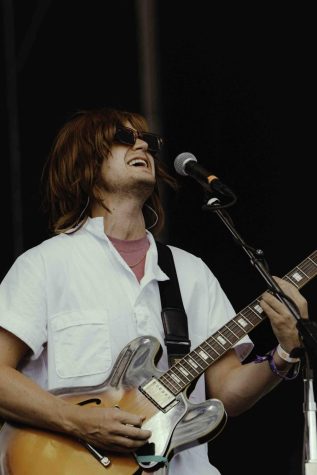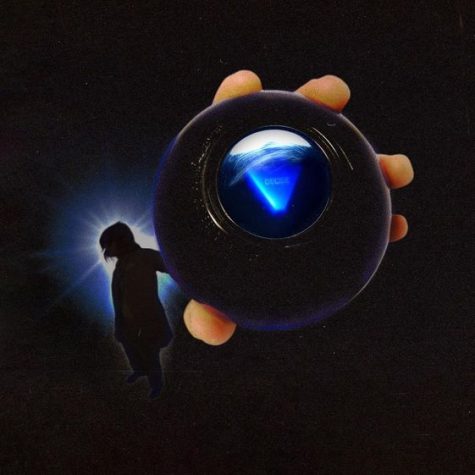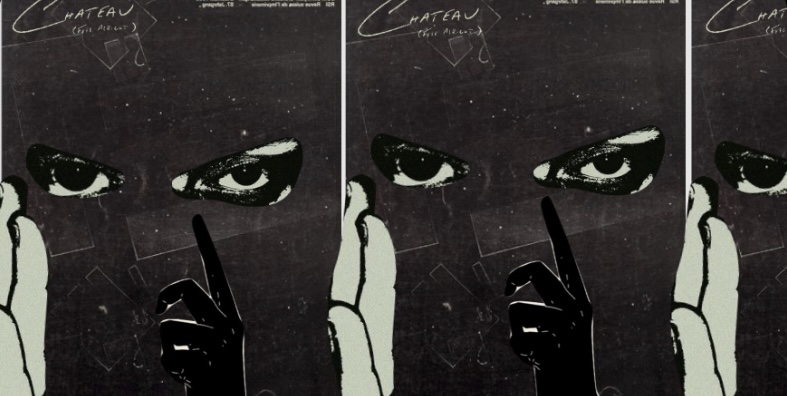Djo, Our Modern 70’s Psych-Synth Pop Star
Collage of Djo’s classic aesthetic from 2019—with his eyes featured on Chateau (Feel Alright)—mashed with his newest album’s current somber vibe.
October 21, 2022
Psychedelic indie rock’s version of Hannah Montana for today’s kids—2022’s real-life pop star in disguise appears on stage for killer hits like Change and Personal Lies. Dressed “undercover” in a wig, funky sunglasses, and sporting a—sometimes—faux mustache, ‘Montana-copycat’ takes the stage as a ‘popstar’. Our beloved multi-hyphenate—actor and singer—Joe Keery, from the hit show Stranger Things and movies like Spree and Free Guy, performs under a pseudonym for Joe—Djo—to keep his music career and acting career somewhat separate. Read on to find out more about Joe Keery, as Djo, and his other musical projects.
Part A – The Artist
Our excitement rises with the release of Djo’s sophomore album, DECIDE, but this is certainly not the beginning of Djo’s music career. With the release of his second album, it’s only fair that we introduce some background information on Djo and his experience as an artist.
In the mid-2010s, Keery was featured in a band called Post Animal—which he is no longer a part of—where he played drums, vocals, and guitar. Post Animal produces similarly described New-Wave, psychedelic rock music.
Much like Keery’s personal music, the Chicago Tribune has described this Chicago-based band’s sound as: “-if Tame Impala listened to a lot of Black Sabbath and were signed to Elephant 6, ” giving us a good idea as to the kind of music both Post Animal and Keery himself produce, and are interested in.
After leaving Post Animal—as to not overshadow the band with his newfound popularity as Stranger Things’ very beloved heartthrob, Steve Harrington—he released his first single in 2019, titled, Roddy. His singles: Roddy, Chateau (Feel Alright), and Mortal Projections were all featured on his first album released on September 13th of 2019 titled Twenty Twenty. The album featured twelve tracks, all with varying sounds, vocal styles, instrumentals, and themes. Some notable, and vastly different, mentions include Flash Mountain and BNBG. Some of his fast-paced, self-proclaimed ‘deconstructed’ hyper-pop indie songs were featured at the Lollapalooza in 2022. Lollapolooza was Djo’s biggest performance that even showcased some unreleased songs from his upcoming album at the time, DECIDE.

Notable mention, and stand-alone single, Keep Your Head Up, is a high-speed 70’s psych-rock song with a feel-good beat and optimistic lyrics. Djo’s music dips into niche genres that vary from time to time with neon melodies to slowed trip beats. It’s an all-around fun, musical experience. The tunes are entirely individualistic and can only be described as one of two things: 8-Bit Race Car Jams, or Tame Impala-inspired slow synth.
So why Djo? If his music is highly revered and wildly unique and imaginative, why doesn’t Keery release music under his own name? The answer is that with the stage name Djo there are endless possibilities for how he can brand himself and his music. There is a disconnect between himself as a person, an actor, and himself as a singer.
This distinction between personas, however, was entirely on purpose.
According to an interview with Keery himself with The Daily Beast, the article reads, “Keery’s music persona isn’t actually a persona, per se, it’s just a name he’s invented for Spotify to make sure those listening aren’t thinking about Steve fighting the Demogorgon every time they hear him singing odes to his youth.”
Keery makes his own statement related to this, “It’s not like I’m singing all this music from the perspective of a character. It’s all me…It was just a way to disassociate from myself. I feel like, with [Stranger Things], I’m kind of a character because of the internet. I didn’t want [Steve] to affect people when they’re listening to the music—so releasing it with its own character is a way to give it its own space.”
He’s not just an actor doing a side project, but is someone who loves music and has a whole other career he can dedicate time to and lean into during his downtime. Somewhat a passion project, a hobby, and a dedication, Djo isn’t an afterthought to Keery, but something he’d like to keep up and do alongside acting.
“But if he can surprise listeners long enough to immerse them in his show, then that’s the goal. And even when he’s winking at them with a bit of humor, it’s intentional—he’s interested in being succinct” explained Josh Glicksman, a writer for Billboard, when addressing why Djo dresses the way he does, with the slightly disguised look, for stage appearances.
How many artists do you know actively trying to hide their identity so they can perform on the big stage of Chicago’s version of ‘Coachella’, Lollapalooza? Djo’s low-key and reputable attempts at hiding his status give his music a chance to be seen as a stand-alone project—away from his acting—but also seen for his creativity, which is something admirable from Keery. Not only is it amusing to see well-known Joe Keery sing and perform his own original songs in fun get-ups that involve wigs, but it’s also extremely tactical to think so far ahead when releasing music. Hopefully, when people hear Djo they don’t think ‘It’s Steve Harrington!’ but their first instinct rather is, ‘No way! Djo’s a great guitarist, look at that!’

Part B – The Album
“I wanted to do something that people could move to,” Djo starts, “Something that sounded a little larger in scope, but at the end of the day, the goal is always to write great songs that people remember, that you can listen to over and over again and glean something different from every time,” says Djo, in a recent statement with MusicFeeds, on the release of the album.
“What’s like the reverse or the opposite of what we should be doing? Let’s try to do that…”
-Djo, on DECIDE
With the unveiling of Djo’s entire secondary album—made up of thirteen creative songs, varying wildly in personality—we can happily say this addition to Djo’s discography was a smashing hit. It is obvious his hard work producing this album—with the help of musician and engineer, Adam Thein—over quarantine—paid off well.
In an interview with Billboard, Djo says, “[DECIDE] shifted my entire idea of how I want to go about making music in the future-”
His new dance-oriented, multi-sensory album is beyond polarizing and has finally hit Spotify on September 16th. These dramatic, loud synths and mind-blowing percussions out-beat his first album by miles, exceeding all preconceived expectations Djo had set for himself, as well as his beloved, and heavily dedicated fans’ anticipation.
Track One – Runner, 4:18
Starting off with some Geometry Dash-like retro-wave synth, Runner takes first on the album. It does not disappoint with its 8-bit, outdated video game sound and fast-paced beat. Djo comes in with airy vocals and satisfying lyrics with a recurring pattern.
Though the song lyrics themselves say the album title, rather than the song title, I think Runner is a reference to the ongoing beat. If you think back to pixel video games on arcade machines—like Space Invaders or Pac-Man—the beat gives you the same sense of adrenaline or racing.
The high speed, synth buildup, and glowing melodies perfectly capture the video game vibe. Screaming at the split screen, smashing buttons, and manhandling the joystick—Runner is quite nostalgic, which is a theme we will continue to see through the album (as this is a very personal collection from Djo).
Track Two – Gloom, 2:00
Gloom reigns as the only explicit song on the album, but is more lyric-based than the first track. The song starts with a pounding, technical drum beat and a silly ‘whomp’ sound that leans into the song’s playfulness. Coming back to the geometric vibe, Gloom sounds sort of hexagonal. It’s edgy in a triangular way, rather than a dark eyeliner-and-punk music way.
The lyrics maintain this rhythmic pattern throughout the song. The lines follow a sort of ‘[subject], I’m ready to go’ (ex: ‘I need to walk my dog, I’m ready to go’) pattern that makes me think we’re really rushing. I wonder where we’re going?
While there is no apparent bridge in the song, there is a slight melody change as the tune slowly gets more and more aggressive and the music amps up—almost like yelling over loud club music. Djo, sounding aggravated, throws in some timely pauses accompanied by sound effects. “Umph!”
Track Three – Half Life, 3:47
Djo starts track three with an electronic beat accompanied by whimsical chimes. His vocals are deep and create an eerie, echoey atmosphere. Almost a minute in, the music gets more upbeat with the addition of some drums joined by trippy guitar.
We can’t go this whole way without talking about the lyrics of DECIDE, all a reference to the media and our digital age—which also is a trend we’ll see in the album. I think Djo brings in an interesting concept with the first verse being about himself and his popularity,
“I fight the urge to search my name.”
Many of his songs are extremely captivating because they hold so many artistic elements that you might miss just listening for the first time. Some notable techniques in Half Life are the bits of backward audio distortion that seem to stand out in the background noise; I think it ties into the digital theme well. A big portion of the swelling music is a sort of booming bass sound or blown-out speakers trying to spit out the music as loud as possible.
Another notable mention is the bridge—which is, personally, my favorite bridge on the album—the music clicks and becomes muted as Djo talk-sings in a tone we haven’t heard from him before. The melodic music and soothing voice are really compelling and different compared to the rest of the song.
Djo reveals, in a Bustle article, School of Rock to be a very influential movie in his life, and I feel like we can really see that inspiration here. It’s almost like Djo watched a Jack Black movie while writing this song. Or if Post Animal was doing Tame Impala, who’s doing Black Sabbath (If Black Sabbath was anything like David Bowie)—that mix match of artists is really Djo’s entire vibe.
Ending in a poetic format with short sentences that follow a pattern, it fades out with a slowed voice repeating the same lyric over and over, ‘I adore you.’
Track Four – Fool, 1:54
It’s amazing what Djo can fit into a less than a two-minute song, but a musical genius will always find a way. Fool, my favorite track off the album, has a really playful beat throughout with a love-sick lyric theme and a truly deeper undertone that’s all a reference to media and Djo’s feelings behind performing. The music is so psychedelic and fun that you just want to snap or clap along to it.
Bringing back the whisper lyrics, Djo has a special talent for manipulating his voice to diversify his songs. This song actually contains a lot of different tones that really throw you for a loop, like, ‘This is all one guy?’
We were probably all thinking it, but Power99 1FM said it best—describing Djo’s voice “as a pocket knife multitool.”
This song is quite nostalgic because it reminds me of a childhood classic, Care Bears: Journey to Joke-a-Lot (2004). So if you’re a die-hard Care Bears fan, I’d recommend this song to fulfill your childhood dream of traveling to the Joke-a-Lot city.
Track Five – On and On, 4:03
Bringing back that digital media theme On and On holds the title as Djo’s most vocally impressive song. Djo’s silvery voice sings out in desperation about our planet asking us, his listeners, ‘Don’t you wanna save this planet?’
The beloved ‘whomp’ sound from Gloom makes a comeback, but this time deeper—though this song is much rounder, with no sharp edges. The song is almost luring you in with its repetition of the title referencing phones, ‘Scrolling on an on an on’. It’s clear at this time that Djo must resent his cell phone, or at least have some conflict with the world’s electronic usage.
On and On contains a lot of emotion in his singing. The lyrics are pretty direct and simple, but he sings with passion in an impressive range that was groundbreaking upon first listen. The music amps up with an intense drum solo before the final verse and chorus, finally fading out with some repetition—a signature Djo move. Djo really pulled some impressive vocal stunts and notes on DECIDE.
Track Six – End of Beginning, 2:39
End of Beginning holds the crown of being the first Djo song that sparked immense emotion in me. Djo’s light guitar and rhythmic drums paired with the sorrowful, nostalgic lyrics make for an incredible, somber addition to a mostly upbeat album. End of Beginning really establishes a new side of Djo’s music—mellow sonic ballads—that perfectly juxtaposes the rest of the album.
We’re only on track six and Djo had not failed us, bringing yet another vocal masterpiece. Though his first album is good—and it’s no question that Djo is a good singer—he’s really packing a punch with more sing-songy, technical additions to his discography. Another thing Djo likes to add to his songs is a slowly progressing tone that grows more and more angry or intense. Screaming along to the ending bridge of this song, we really feel every emotion along with him as we sway to this solemn ode to a past life living in Chicago. We really get to connect with Djo through these personal songs that talk a lot about his reactions, feelings, and experiences.
I like to think of this song as a love song dedicated to Chicago. He even references a French love poet from the medieval era, Troubadour. The reference to his age, his sister—Caroline—and the repeating lyric ‘You take the man out of the city, not the city out the man’ backs up the ‘Love Song to Chicago’ theory. If it’s not an Ode to Chicago, then it is definitely a sad song about his youth that could make any of us sympathize to tears.
End of Beginning is a special, sparkling-diamond song—precious and personal.
Track Seven: I Want Your Video, 2:08
Jumping right back into what Djo does best with this energetic song, we get yet another funky head-bop-worthy tune about Djo holding his girlfriend’s bag at the club while she dances—how cute. Shifting back and forth from his lively, stylized vocals to his more heartfelt tone that never fails to make his listeners swoon, we’re taken through this back-and-fourth chorus. The romantic lyrics combined with his otherworldly groove that reaches an ethereal state makes for such a great addition to DECIDE.
The overall song is like a personal rendition—and a symphonic masterpiece—of Sober by Childish Gambino. Two great songs that you could absolutely put on a playlist together. Would recommend.
My personal favorite aspects of this song are his melodramatic vocals, but especially the little bridge he sneaks in at the end of the song.
“If I’m your moon, and you’re my star-”
Very reminiscent of Ace Frehley, KISS’s original guitarist as well as solo artist, self-titled album Ace Frehley. Similar to Frehley’s song, New York Groove, Djo takes us right back to 1978 with an iconic loud, yelling-type bridge in a sing-songy style. This is something we’ve seen from Djo before, and it never fails to make the song a real live wire.
Track Eight: Climax, 3:55
As the title suggests, this is the height of the album—being in the near middle, and being a slower song that’s easier to digest. This pulsating, ongoing beat holds an eerie tone that is a bit whimsical and longing.
“An older me I met before, Déjà vu”
This electronic, techno song has some subtle drums and a predicted melody change near the end—still upholding its ghostly, mysterious vibe. The beat drops after much anticipation, making the song true to its title—Climax.
Track Nine – Change, 2:57
Enter Djo’s drums, Change greets us with an immediate beat that proves its worth on the album. Polished and perfected since June of this year, we get to hear Change in a lineup of other amazing songs that match its vibe perfectly.
Change is just another excuse for Djo to show off his enchanting vocals and lyricism. This genius musician included a Delta flight from Minneapolis to Boston into the lyrics—’DL909 at altitude’—completely under the nose due to it sounding just like scatting—dee oh nanan, doo do do. Upon hearing something as 70’s-psych-funk as Change, we can ask ourselves, “Could anyone else do it like him?”
The answer is no, no one can.
Track Ten – Is That All It Takes, 0:20
This song gets its five-minute fame—more like twenty seconds—with its repeating lyrics and high-pitched vocals.
You might be thinking this track is entirely useless, but it serves a great purpose. Though it’s not much, it’s still essential to DECIDE’s magic. If you listen to the album in order, you’ll notice this song creates the best transition on the album. Absolutely mind-blowing.
Track Eleven – Go For It, 3:01
Starting Go For It with a smooth intro that bleeds in from track ten, Is That All It Takes, we hear the overwhelming bass booming that cuts straight into some creative music. With a thump, Djo’s vocals come in with his similar, yet wonderful talent that was showcased in End of Beginning. Bringing back the fun arcade game-style music from before, this time with a more 1987 Street Fighter vibe—if you’ve ever played Street Fighter, or heard England (Eagle) (A track from the Street Fighter soundtrack) you would know.
Every time Djo builds the music to an almost-overwhelming level, it’s like a little dose of serotonin. Breaking out into a smile as the music swells, is an unlimited joy—especially if the beat drops. The build-up in this song gives that same gratifying feeling.
Track Twelve – Figure You Out, 3:04
Djo is bringing back the slow beats with another killer song you can sway to. This belty, vocal-focused song is charming with a hint of sad undertones. As we count down to the end of the album, Figure You Out is a great smoother sound compared to the last few tracks.
“Tell me then would you lend a hand?”
He sings out almost desperately for an answer, a little enraged or frustrated with whoever he’s singing to. With the past theme of media and digital consumerism, we can safely guess that this is a sort of call out to something Djo experiences or has heard and seen before.
Djo even brings up an interesting contribution to this with the lyric ‘If the money just wasn’t there-’ (Which loops back to what’s sung in Runner.) It’s more obvious now that whatever power he’s singing so throatily about has money and isn’t lending that hand Djo questions. Whatever the motive of the second party in the song is, Djo lets us know they—whoever they are—aren’t good. Corporations? Corrupted civilization? Who knows.
Track Thirteen – Slither, 1:50
Closing out the album with the best send-off song, Slither takes its place in the top three ‘best songs off DECIDE’ in my opinion. Showing off Djo’s various ideas throughout DECIDE, Slither really sells whatever Djo’s got with this synth-dripped, percussion-packed song.
Adam Thein—project producer, musician, and engineer that worked with Djo—told Billboard, when discussing Slither, “Keery tracked drums from the studio’s bathroom to achieve a desired echo effect… Joe has so many ideas, and it’s me frantically trying to keep up and execute them quickly. He’s not afraid to try ten things to get the right thing.”
It’s admirable that Djo is so ambitious with his music and trying to perfect it. This craft is evidently really important to him, which I think creates a great relationship with his music. Djo’s dauntless approach to making music really adds that personalized touch that reaches a broad spectrum of musicality. Djo really shows he has a lot to offer as a musician. When he receives good feedback on his hard work, it must feel nice to have his executed ideas validated.
Looking back into Slither, the instrumental towards the end is very One More Hour by Tame Impala, however, this might be intentional since Djo has mentioned Tame Impala to be an inspiration of his—specifically with the album Currents.
Slither feels very primal, almost dirty like a raw, unpolished cutting of a song that drills into your brain—it’s good at working its addictive sound. You could loop it for hours.
Part C – Conclusion
After touching base on this album—chock full of bursting drums and elated synth-focused music—it’s safe to say confidently, that Djo had made yet another amazing collection. We can appreciate DECIDE for everything it is, with all its quirks and much necessary little additions that make this such a well-rounded album.
Djo’s retro, auditorial adventure has blown the fans away, totally giving us the unexpected with this piece. This really is the kind of album you can loop infinitely and never get bored. There was too much put into this to not listen for as long as you can, the worth of the album exceeds space and time.
While waiting for the next release—that will probably outdo this album, just as it did his freshmen album, Twenty Twenty—we can sit back and support what we anticipated for the better part of two months.
Stellar work from Djo as always, I can’t wait for his next project.



